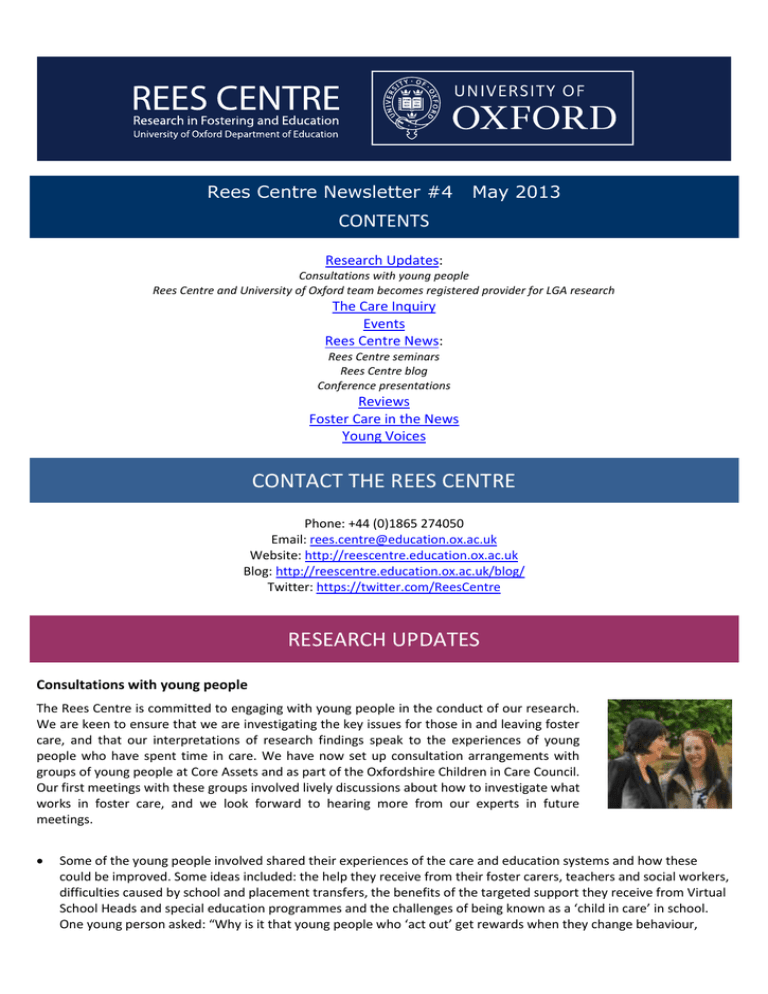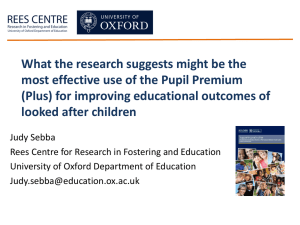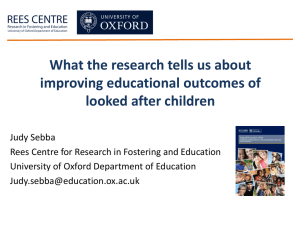Rees Centre's Newsletter #4 from May 2013
advertisement

Rees Centre Newsletter #4 May 2013 CONTENTS Research Updates: Consultations with young people Rees Centre and University of Oxford team becomes registered provider for LGA research The Care Inquiry Events Rees Centre News: Rees Centre seminars Rees Centre blog Conference presentations Reviews Foster Care in the News Young Voices CONTACT THE REES CENTRE Phone: +44 (0)1865 274050 Email: rees.centre@education.ox.ac.uk Website: http://reescentre.education.ox.ac.uk Blog: http://reescentre.education.ox.ac.uk/blog/ Twitter: https://twitter.com/ReesCentre RESEARCH UPDATES Consultations with young people The Rees Centre is committed to engaging with young people in the conduct of our research. We are keen to ensure that we are investigating the key issues for those in and leaving foster care, and that our interpretations of research findings speak to the experiences of young people who have spent time in care. We have now set up consultation arrangements with groups of young people at Core Assets and as part of the Oxfordshire Children in Care Council. Our first meetings with these groups involved lively discussions about how to investigate what works in foster care, and we look forward to hearing more from our experts in future meetings. Some of the young people involved shared their experiences of the care and education systems and how these could be improved. Some ideas included: the help they receive from their foster carers, teachers and social workers, difficulties caused by school and placement transfers, the benefits of the targeted support they receive from Virtual School Heads and special education programmes and the challenges of being known as a ‘child in care’ in school. One young person asked: “Why is it that young people who ‘act out’ get rewards when they change behaviour, whereas those who don’t behave badly never get rewarded for anything? Isn’t that encouraging bad behaviour?” Young people also provided invaluable ideas and feedback on some of the Centre’s current research projects. Particular issues we discussed included: selection of participants, impact of the research and evaluation on young people, data collection methods, incentives for participants and dissemination. Young people emphasised the importance of building strong relationships with participants, managing expectations and fulfilling any stated commitments. The insights the groups offered into how to involve and reach out to others interested in the research findings were very poignant and perceptive; these can only improve the relevance and quality of future work. Rees Centre and University of Oxford team becomes registered provider for LGA research A team from the Rees Centre and the University of Oxford Department of Education consisting of Judy Sebba and Steve Strand, assisted by Nikki Luke, James Hall, Lars-Erik Malmberg and Aoife O'Higgins, has been successful in becoming a registered provider (selective tendering) for the Local Government Association (LGA). The agreement covers research using quantitative, qualitative and statistical modelling techniques. The contract runs for two years from 1st April 2013. THE CARE INQUIRY The Care Inquiry The Care Inquiry is the result of eight charities getting together to investigate the issue of permanence for children who cannot live with their parents. The charities involved were Adoption UK, BAAF (British Association for Fostering and Adoption), Family Rights Group, the Fostering Network, Research in Practice, TACT, the Who Cares? Trust and the Together Trust, and the Inquiry was supported by the Nuffield Foundation. The charities were interested in all of the options for providing stable and permanent homes for children in England, in light of the Government’s focus on adoption. The work of the Inquiry involved a review of research evidence, three Inquiry sessions which were attended by 200 people, consultation with children and young people, a parliamentary briefing and extensive social media activity. The Inquiry’s final report outlines its findings and recommendations: The need for urgent action and a fresh approach to the ‘care system’ - the system continues to fail too many children, and there are huge local variations in the quality of services; a more flexible approach is needed, with support based on need and not legal status The importance of recognising the different routes to ‘permanence’ - permanence means “security, stability, love and a strong sense of identity and belonging” and is not connected to legal status; there is a need to recognise the potential for permanence in returning home, kinship care, foster placements, special guardianship and residential care The importance of relationships: ‘the golden thread’ - the quality and continuity of relationships should be at the heart of the care system, informing planning and practice, as this is what helps children to construct an identity and a sense of belonging - the report recommends the need to nurture positive relationships through practice, support heritage and identity, plan for strong and continuing relationships, sustain relationships with birth families, provide longterm help and support, recognize changing perspectives on relationships over time ad focus on relationship quality The need to involve everyone who matters in planning and decision making - the report recommends the need to involve children and parents in decisions about their life, involve carers and delegate day-to-day decisions to them, and involve those with care experience in service development Transitions should be avoided where possible; when they are necessary, support should be in place, including support for continuing relationships - the report recommends that service providers and carers work together to minimize disruption at times of transition by supporting valued relationships over time High-quality training, support and supervision is needed for the whole ‘workforce’ around the child - the report recommends that social worker training should help to develop knowledge and skills that reflect the challenges workers will face in practice, and that greater focus should be placed on how carers and residential staff can be supported in working with young people, as well as on the effectiveness of schools’ practices with children in care The system needs to change to reflect different pathways to permanence and to focus on focus on quality of placements in inspecting and commissioning services - the report recommends that foster care is formally recognised as a long-term placement, that greater support is available for kinship care and for independent reviewing officers, that attention is given to placement quality and to the reduction of disruptions as a result of organisational change, and that legislation should support an increased focus on relationships Full details of the Care Inquiry, including the final report and research review undertaken by Dr Janet Boddy (Centre for Innovation and Research in Childhood and Youth, University of Sussex) to support the Inquiry, can be found at http://thecareinquiry.wordpress.com EVENTS Wednesday 22 May 2013 10.30-11.30am, 15 Norham Gardens (Common Room) Special event for Foster Care Fortnight ‘Bake the Difference’ coffee morning in aid of The Fostering Network Come along to enjoy coffee and cake (for a small donation) with all proceeds going towards The Fostering Network’s vital work as the UK’s leading charity for everyone involved in foster care. Meet the Rees Centre team and find out more about our exciting new programme of research on fostering. Monday 3 June 2013 5.00-6.30pm, 15 Norham Gardens (Seminar Room A) Part of the University of Oxford Department of Education’s Seminar Series Safeguarding children in the early years: research messages for professionals in education Professor Harriet Ward, Director of the Centre for Child and Family Research, Loughborough University, Co-Director Childhood Wellbeing Research Centre Drinks will be served after the event. REES CENTRE NEWS Rees Centre seminars The fourth Rees Centre Public Seminar was held on 20th March 2013. Professors Mike Stein and Sonia Jackson explored the topic of ‘Leaving care: outcomes for fostered young people’. Mark Rogers, Chief Executive of Solihull Council and Society of Local Authority Chief Executives (SOLACE) responded with a practice perspective. Our blog post on the session includes questions from some of our blog readers with responses from our speakers. We invite you to read the post and leave your comments: http://reescentre.education.ox.ac.uk/about-us/leaving-careoutcomes-for-fostered-young-people/ On 4th March 2013, Professor Ann Phoenix, Co-Director of the Thomas Coram Research Institute, Institute of Education University of London, and Co-Director of the Childhood Wellbeing Research Centre, spoke on the topic of ‘Research on childhood well-being: gender and racialised identities’. Ann’s talk covered the debates about ‘well-being’ as a concept. She went on to consider how ethnicity, gender and social class intersect in ways that impact on young people’s wellbeing. The discussion drew on data from studies of masculinities, consumption and adults looking back on their childhoods to consider young people’s accounts of their experiences. Video footage of all of our seminars is currently being prepared and will be posted on our website. Rees Centre blog We welcome your comments on the following topics: ‘(Vulner)ability and creative action research spaces’ – guest post by Dr Sevasti-Melissa Nolas http://reescentre.education.ox.ac.uk/about-us/vulnerability-and-creative-action-research-spaces/ ‘The importance of good social workers’ – guest post by foster carer Lynne Blencowe for World Social Worker Day http://reescentre.education.ox.ac.uk/about-us/the-importance-of-good-social-workers/ ‘What works well in respite foster care?’ – guest post by Jim Theofelis http://reescentre.education.ox.ac.uk/about-us/what-works-well-in-respite-foster-care/ ‘Why are foster carers important?’ – guest post by Richard Brandford for Foster Care Fortnight http://reescentre.education.ox.ac.uk/about-us/why-are-foster-carers-important/ Conference presentations On March 12 2013 Judy spoke to the University of Oxford postgraduate students’ conference on ‘Why empirical research should always be informed by systematic reviewing of the literature and user engagement’. Judy presented the case for greater use of systematic reviewing and more attention being given to user engagement. She noted that systematic reviewing democratizes research by opening it up to greater scrutiny. She gave examples of reviewing and the involvement of users – care leavers, carers and professionals – in the Rees Centre research. Following this presentation, the doctoral students requested a practical workshop on systematic reviewing which Judy, Nikki and Aoife ran on 3 May. On 18 March 2013 Nikki spoke at a research seminar on children and young people’s mental health for the Sussex Partnership NHS Foundation Trust. Nikki worked with Professor Robin Banerjee from Sussex to present talks on ‘Mental health and peer relationships’, ‘Peer relations, social understanding and empathy in looked-after children’ and ‘Clinical applications of research on looked-after children’ – using the latter to examine the potential of interventions such as Video Interaction Guidance, mentalization-based therapy and school-based approaches. Slides for the first two talks are available at http://www.sussexpartnership.nhs.uk/r-and-d/events-comms/seminar-programme/presentations . On 27 March 2013 Judy addressed the National Virtual School Headteachers’ Conference at Bath Spa University, on the topic of ‘The implications of the impact of trauma and attachment needs for children and schools’. She described the research being undertaken by the Rees Centre and noted that existing research suggests that placement stability and educational achievement of children in care affect one another though the exact nature of this relationship is as yet, unclear. On 19 April 2013 Aoife presented a paper at the London Centre for Social Studies PhD Conference 2013: Methodological Choices and Challenges. She discussed the various methodological hurdles she faced while carrying out her systematic review on ‘Risk and protective factors for the educational well being of children in care’. The presentation also advocated for the greater use of systematic reviews in the social sciences. Aoife presented some of the methodological limitations of her review as well as some initial findings, namely that there is strong evidence that poverty and maltreatment are important risk factors, unlike the experience of care which is not necessarily damaging to children's outcomes. Forthcoming events On 1 July 2013 Judy and Nikki will present a workshop at The National Commissioning and Training Conference, (NCCTC) Swanwick Derbyshire on ‘Developing research-informed fostering services: The motivation to foster and foster carer support studies’. On 2 July 2013 Judy will present a keynote at the University of York 50th Anniversary celebration conference on Linking Research to Practice. On 9 July 2013 Judy will present a keynote to the Surrey County Council conference for designated teachers of looked after children. On 12 July 2013 Nikki will be presenting her work on empathy and social understanding in maltreated children as part of a symposium on theory of mind at the European Congress of Psychology in Stockholm. On 16 September 2013 Judy will contribute to a symposium on family-based care in different countries at the International Foster Care Organisation World Conference in Osaka, Japan. REVIEWS Proud Parents Nicola Hill BAAF, 2013; £13.95 As a gay parent I have heard past criticism from both the gay and straight communities that LGB adoption and fostering makes children the latest must-have accessory for gay people. Reading Proud parents by Nicola Hill gives a reassuring insight into the world of Lesbian and Gay fostering and adoptive parents, their motivations, their struggles, their successes, and the thoughts and feelings of young people placed with them. This book also demonstrates how things have changed over time, and that attitudes have definitely changed positively towards lesbian, gay, and bisexual fostering and adoption. The book is an excellent resource for social workers, carers and prospective carers. It is very evident that the contributors have given their frank honest experiences. They are not trying to draw a comparison between gay and straight parenthood, they are sharing their reality, their methods, and what makes them good parents. Proud Parents details the real life experiences of 16 families, a mixture of lesbian and gay, singles and couples, and adopters and foster carers. Each family describes their motivations to become parents, what sacrifices they have made, difficulties and joys they have experienced, and the battles along the way. Graham and Charlie adoptive parents of two boys state “We couldn’t love our children any more if they were our birth children”, Stephanie and Jenny also explain about their experiences of being foster parents “It is extremely rewarding seeing a child change from the time when they arrive at your door with a small bag of things to becoming a confident and mature young person, contributing to society and pursuing activities with a circle of friends”. One of the best things about reading these accounts is that sexual orientation is evidently just a small part of the way these families define themselves, and their motivations are to be parents and make positive and lasting differences to the lives of young people. For social workers reading these accounts, they all contain handling tips for social workers, this gives an excellent insight into the how families see their experiences during the assessment and matching processes. Every social worker will put this book down having a greater understanding of the needs to LGB families and family’s needs in general, an understanding that is not taught at University. Eduardo and Colin stated “You also need to make sure you would ask a heterosexual man the same questions as you ask a homosexual man. Don’t make us jump through more hoops than straight men or women. Be supportive of lesbian and gay adopters.” Overall the book made me smile, sometimes feel angry about the ways these people have been treated, and feeling warm hearted about the comments that young people have made about their new parents. It is an easy read, and is ideal to be left on your coffee table for anyone to dive in for ten minutes for inspiration and sometimes just to be a little bit nosey. This book is a true triumph for Nicola Hill, and I hope that this book is added to with future volumes. Reviewed by Stuart Bray, Equality and Diversity Co-ordinator, Core Assets FOSTER CARE IN THE NEWS Independent fostering providers plead for greater autonomy – Children & Young People Now, 5th March 2013 http://www.cypnow.co.uk/cyp/news/1076486/independent-fostering-providers-plead-autonomy The future of foster care – Children and Young People Now, 5th March 2013 [subscriber-only content] http://www.cypnow.co.uk/cyp/feature/1076489/the-future-foster-care Charities call for U-turn on ‘bedroom tax’ for foster carers – The Fostering Network, 6th March 2013 https://www.fostering.net/media/2013/charities-call-u-turn-bedroom-tax-foster-carers#.UT9rF6VgNFJ Moving forward: implementing the ‘Guidelines for the Alternative Care of Children’ – Better Care Network, 7th March 2013 http://bettercarenetwork.org/BCN/details.asp?id=30492&themeID=1001&topicID=1007 Partial U-turn over bedroom tax announced by Iain Duncan Smith – The Guardian, 12th March 2013 http://www.guardian.co.uk/society/2013/mar/12/bedroom-tax-u-turn Bedroom tax campaign continues – The Fostering Network, 13th March 2013 http://www.fostering.net/news/2013/bedroom-tax-campaign-continues#.UUCWOqVgPFI MPs publish report on youth justice – Parliament website, 14th March 2013 http://www.parliament.uk/business/committees/committees-a-z/commons-select/justice-committee/news/youthjustice1/ Risk and protective factors for child abuse and neglect – Australian Institute of Family Studies, 25th March 2013 http://www.aifs.gov.au/cfca/pubs/factsheets/a143921/index.html Outcomes for care leavers in Northern Ireland – Northern Ireland Executive, 27th March 2013 http://www.northernireland.gov.uk/index/media-centre/news-departments/news-dhssps/news-dhssps-270313publication-of-northern.htm?WT.mc_id=rss-news Why social pedagogy matters for foster carers – The Guardian Social Care Network, 28th March 2013 http://www.guardian.co.uk/social-care-network/2013/mar/28/social-pedagogy-foster-care?CMP NICE expands into social care – National Institute for Health and Care Excellence, 3rd April 2013 http://www.nice.org.uk/newsroom/news/NICEExpandsIntoSocialCare.jsp Understanding attitudes, motivations and barriers to adoption and fostering – Department for Education, 5th April 2013 http://www.education.gov.uk/childrenandyoungpeople/families/adoption/a00223862/adopter-recruitment Project set to look at the bright side of care – Children & Young People Now, 8th April 2013 http://www.cypnow.co.uk/cyp/news/1076857/project-set-look-bright-care Scotland plans to extend support to care leavers up to 25 – National Care Advisory Service, 12th April 2013 http://leavingcare.org/news?page_ID=14&news_ID=487 We need to value foster care, not fixate on adoption – The Guardian Social Care Network, 16th April 2013 http://www.guardian.co.uk/social-care-network/2013/apr/16/value-foster-care-adoption?CMP Thousands of children in care go missing every year – The Independent, 24th April 2013 http://www.independent.co.uk/news/uk/home-news/thousands-of-children-in-care-go-missing-every-year8585289.html YOUNG VOICES We end here with the thoughts of Matt, a care-experienced member of A National Voice. My name is Matt, I'm 21 years old and was in care for 11 years, my time in care was mixed with over 25 placements and many issues along the way. If I could change 2 things with leaving care services they would be to make all Local Authorities provide an independent living skills course over a 2 year period with 6 months focused on budgeting, and the second would be to ensure all care leavers can easily access emotional/ mental health support if needed when living independently. The reasons why are simple; far too many care leavers end up homeless, heavily indebted or suffering emotional or mental problems. I believe that by making all Local Authorities provide the 2 years support and training for independence the number of care leavers in difficulty would reduce dramatically. I was lucky enough to get on a course which gave me the basic skills to live on my own but there was not much focus on budgeting, I was only offered budgeting support after I was heavily indebted which was too late, if I had budgeting advice and support prior to independence I wouldn't have got into debt. Part of the problem with care leavers and debt is the dramatic change in finance when you leave care, you are brought up used to getting a lot of money then when you leave care you get £100 a fortnight to meet all your needs which can be a shock if you were not prepared. The 2nd change is needed to ensure that all Care Leavers can easily access emotional or mental health support once you've left care, mainstream services struggle to deal with the issues care leavers have, in my personal experience.




